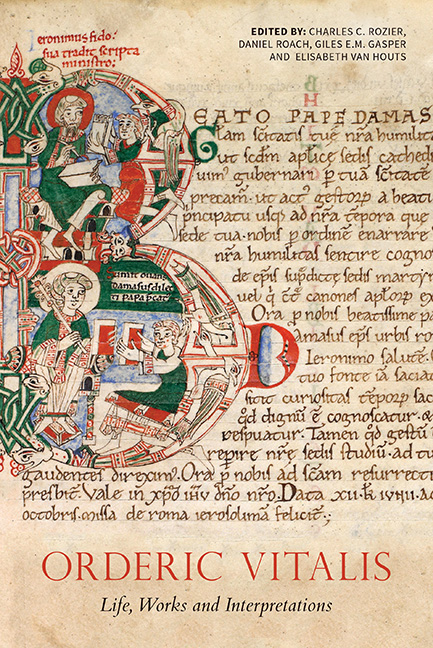Book contents
- Frontmatter
- Dedication
- Contents
- List of Illustrations
- Acknowledgements
- List of Abbreviations
- Chronology of the Lives of Odelerius and his Son Orderic Vitalis
- Composition of the Historia ecclesiastica
- Introduction: Interpreting Orderic Vitalis
- Orderic and his Father, Odelerius
- Following the Master's Lead: The Script of Orderic Vitalis and the Discovery of a New Manuscript (Rouen, BM, 540)
- Orderic Vitalis as Librarian and Cantor of Saint-Évroul
- Saint-Évroul and Southern Italy in Orderic's Historia ecclesiastica
- Orderic and English
- Inscriptions in Orderic's Historia ecclesiastica: A Writing Technique between History and Poetry
- Reading Orderic with Charters in Mind
- Orderic Vitalis and the Cult of Saints
- Orderic's Secular Rulers and Representations of Personality and Power in the Historia ecclesiastica
- Worldly Woe and Heavenly Joy: The Tone of the Historia ecclesiastica
- Orderic Vitalis, Historical Writing and a Theology of Reckoning
- Jesus Christ, a Protagonist of Anglo-Norman History? History and Theology in Orderic Vitalis's Historia ecclesiastica
- ‘Studiosi abdita investigant’: Orderic Vitalis and the Mystical Morals of History
- Meanders, Loops, and Dead Ends: Literary Form and the Common Life in Orderic's Historia ecclesiastica
- Orderic and the Tironensians
- ‘One single letter remained in excess of all his sins …’: Orderic Vitalis and Cultural Memory
- The Reception of Orderic Vitalis in the Later Middle Ages
- Appendix 1 Archaeological Investigations at the Abbey of Saint-Évroult-Notre-Dame-des-Bois
- Appendix 2 Descriptive Catalogue of Manuscripts Featuring the Hand of Orderic Vitalis
- Select Bibliography
- List of Manuscripts Cited
- General Index
Orderic Vitalis as Librarian and Cantor of Saint-Évroul
Published online by Cambridge University Press: 25 October 2017
- Frontmatter
- Dedication
- Contents
- List of Illustrations
- Acknowledgements
- List of Abbreviations
- Chronology of the Lives of Odelerius and his Son Orderic Vitalis
- Composition of the Historia ecclesiastica
- Introduction: Interpreting Orderic Vitalis
- Orderic and his Father, Odelerius
- Following the Master's Lead: The Script of Orderic Vitalis and the Discovery of a New Manuscript (Rouen, BM, 540)
- Orderic Vitalis as Librarian and Cantor of Saint-Évroul
- Saint-Évroul and Southern Italy in Orderic's Historia ecclesiastica
- Orderic and English
- Inscriptions in Orderic's Historia ecclesiastica: A Writing Technique between History and Poetry
- Reading Orderic with Charters in Mind
- Orderic Vitalis and the Cult of Saints
- Orderic's Secular Rulers and Representations of Personality and Power in the Historia ecclesiastica
- Worldly Woe and Heavenly Joy: The Tone of the Historia ecclesiastica
- Orderic Vitalis, Historical Writing and a Theology of Reckoning
- Jesus Christ, a Protagonist of Anglo-Norman History? History and Theology in Orderic Vitalis's Historia ecclesiastica
- ‘Studiosi abdita investigant’: Orderic Vitalis and the Mystical Morals of History
- Meanders, Loops, and Dead Ends: Literary Form and the Common Life in Orderic's Historia ecclesiastica
- Orderic and the Tironensians
- ‘One single letter remained in excess of all his sins …’: Orderic Vitalis and Cultural Memory
- The Reception of Orderic Vitalis in the Later Middle Ages
- Appendix 1 Archaeological Investigations at the Abbey of Saint-Évroult-Notre-Dame-des-Bois
- Appendix 2 Descriptive Catalogue of Manuscripts Featuring the Hand of Orderic Vitalis
- Select Bibliography
- List of Manuscripts Cited
- General Index
Summary
An established consensus included in almost every recent study of Orderic Vitalis's life and works suggests that he acted as librarian of Saint-Évroul. His well-documented role in helping to compile the twelfth-century Saint-Évroul book-list, and his identified activities in reviewing and correcting manuscripts completed by other, perhaps more junior, scribes, have encouraged several notable, if brief, statements on the topic. Chibnall argued that in adding to the book-list and the calendar of Saint-Évroul's ‘chapter-book’, Orderic was ‘perhaps acting as librarian’, and elsewhere suggested that he had worked as an armarius. Similarly, Nortier cited Orderic's role in the book-list in the course of her proposition that the list was compiled, and perhaps even ordered, by Orderic's authority. Van Houts suggested that Orderic's corrections to several manuscripts highlight his possible roles ‘in charge of the scriptorium at Saint-Évroul and perhaps librarian and archivist as well’. More recent are Escudier's remarks that Orderic worked as librarian for the last thirty years of his life.
Despite the frequency of this claim that Orderic was librarian at Saint-Évroul, the precise circumstances in which he was given charge of books within the community, and the exact duties associated with the role, remain surprisingly little explored given their potential significance within the study of Orderic's life and works. The discussion which follows attempts a detailed analysis of Orderic as librarian at Saint-Évroul, drawing on evidence from within the Historia ecclesiastica, alongside a fresh examination of his additions to the surviving corpus of Saint-Évroul manuscripts, in order to understand the nature of his role more accurately and comprehensively.
As Chibnall noted, a monastic librarian active in Normandy during the eleventh and twelfth centuries was likely to have been an appointed official known as an armarius. While descriptions of this role are found in a number of contemporary guides to the organisation of communal religious life, the position is also sometimes referred to as that of precentor, or the more common form of cantor. For example, a mid-eleventh-century Cluniac text known as the Liber tramitis uses both cantor and armarius, while Ulrich of Zell's near-contemporary Consuetudines antiquiares Cluniacenses uses precentor and armarius.
- Type
- Chapter
- Information
- Orderic Vitalis: Life, Works and Interpretations , pp. 61 - 77Publisher: Boydell & BrewerPrint publication year: 2016



